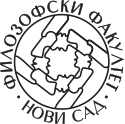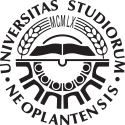15FLFL028 - Media Epistemology
| Course specification | ||||
|---|---|---|---|---|
| Course title | Media Epistemology | |||
| Acronym | 15FLFL028 | |||
| Study programme | Philosophy | |||
| Module | ||||
| Type of study | first degree undergraduate academic studies | |||
| Lecturer (for classes) | ||||
| Lecturer/Associate (for practice) | ||||
| Lecturer/Associate (for OTC) | ||||
| ESPB | 3.0 | Status | ||
| Condition | No additional requirements. | Oblik uslovljenosti | ||
| The goal | The students will become acquainted with the epistemological reflecting on the common phenomenon of mediality and the specificity of the epistemological approach in the consideration of several media. | |||
| The outcome | The students are enabled to recognize the relevance of media not only for transferring, distributing and storing knowledge in different discourses and social institutions but also for its forming and accepting. They will recognize mediality as a very constitutive trait of the knowledge and the media as poles which hold the building of (scientific) knowledge. | |||
| Contents | ||||
| Contents of lectures | The task of epistemology of media: the study of forming and transfer of knowledge by media (writing, print, photography, film, radio, television, internet etc.). Wide and narrow sense of »media«. Transfer of information and communication. Media and public opinion. The problem of media deception. Simulacra and simulation. Transformation of perception and cognition determined by use of media. Medial construction of reality. Elimination of stereotypes regarding the exclusively negative influence of media on the world view of its users. Critics of media (discussion of its adequacy). Comparison with similar types of theory: theory of »objective mind« as an early form of epistemology of media (Hegel, Hans Freyer, Nicolai Hartmann). Medial philosophy of mind. Systems theory and radical constructivism. Theories of social memory. | |||
| Contents of exercises | Discussion of seleceted texts. | |||
| Literature | ||||
| ||||
| Number of hours per week during the semester/trimester/year | ||||
| Lectures | Exercises | OTC | Study and Research | Other classes |
| 1 | 2 | |||
| Methods of teaching | Dialogical method, text analysis | |||
| Knowledge score (maximum points 100) | ||||
| Pre obligations | Points | Final exam | Points | |
| Activites during lectures | 15 | Test paper | ||
| Practical lessons | 20 | Oral examination | 50 | |
| Projects | ||||
| Colloquia | 15 | |||
| Seminars | ||||

